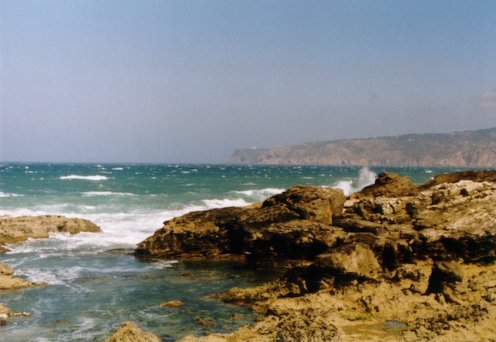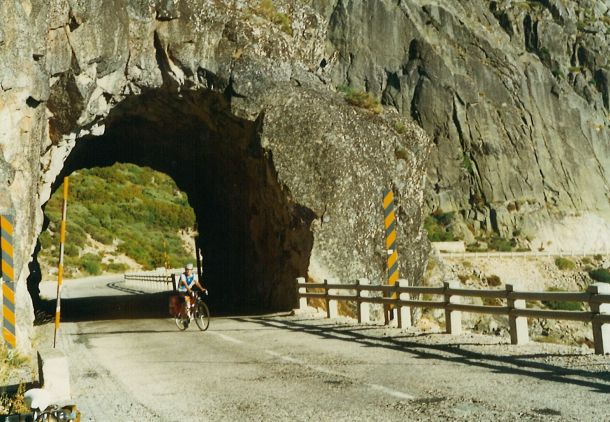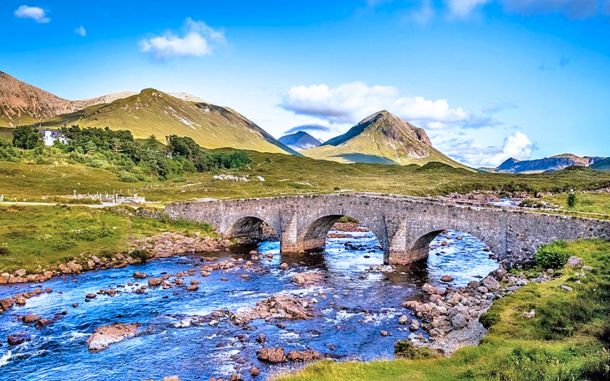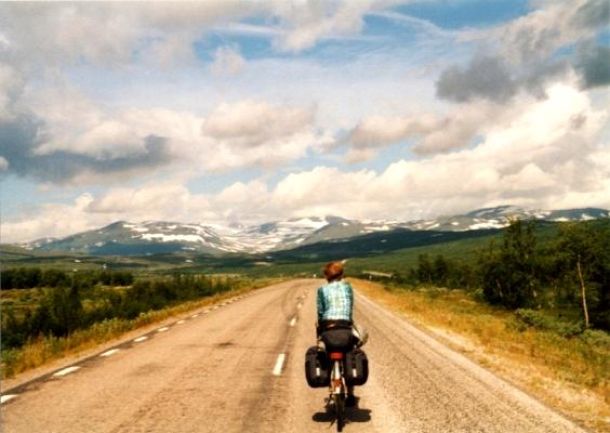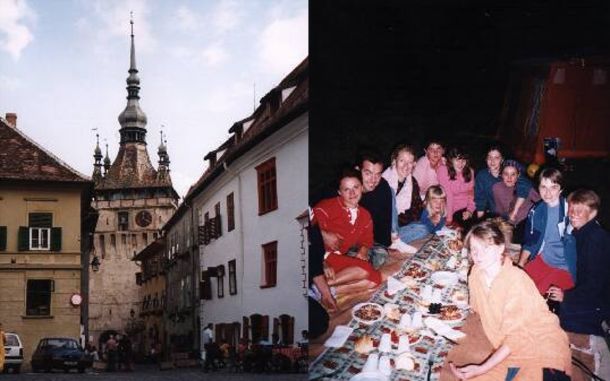Portugal on bikes '96
Although our travel experience is at least very outdated, I think some of it might still be useful to some.
If not, I present them as a picture of the time and transmit them unchanged as I wrote them in the fall of 1996.
Photos and lousy resolution are taken from the old site. In time, I may return to replacing them with newly scanned originals.
Introduction
In 1996, we decided to transport our daughter to an international gathering of young musicians and spend four weeks traveling around Portugal. We left the car in a parking lot near Lisbon and drove 1700 km from Lisbon during the three weeks of Lisbon, the historic provinces of Ribatejo, Alto Alentejo, Beira Baixa, Beira Alta, Trás-os-Montes, Minho, Douro Litoral, Beira Litoral and Estremadura back to Lisbon. We wanted to keep the southern provinces of Baixo Alentejo and the Algarve at the end, but some day it took a tour of Lisbon and so, perhaps next time ... I think the knowledge from the travels might be useful to many.
Climate
The Atlantic is a huge heat accumulator and therefore has a very strong effect on weather formation. It rains only rarely in summer. It is hot during the day, and in clear weather, which has prevailed for almost the whole summer, it is unbearable on the southern slopes due to its weaker nature. At night, except for the highest mountain locations, it is also very warm. The big enemy of cyclists is the wind, which you will enjoy in Portugal to a great extent. The fresh to strong winds of the west will probably accompany you almost constantly.
Landscape and nature
At the coast and lower reaches of large rivers, there are slightly undulating lowlands, which after several tens of kilometers further inland, especially in the north, turn into a hilly to mountainous landscape with deep and steep valleys with numerous dams.
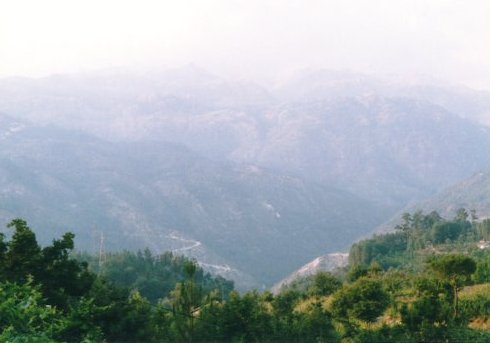
Serra da Estrela - the highest mountain range in Portugal, is characterized by forest-free rocky peaks that fall steeply into the valley.
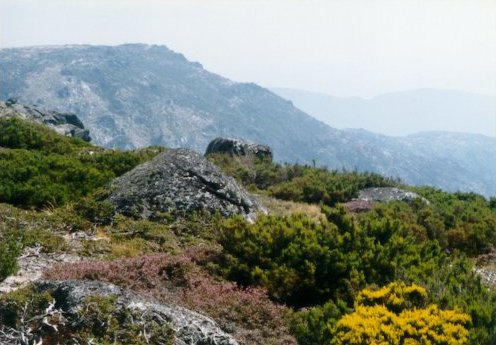
Further north, in the mountains that make up the border with Galicia, Spain, nature is even greener at the end of the summer, and the mountain peaks are steeper and more pointed, albeit a few hundred meters lower.
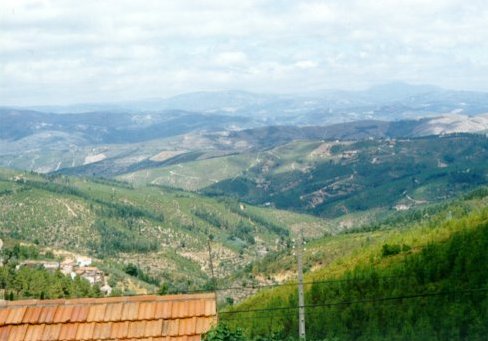
Every day you come across one of the medieval castles (again "Castelo"), which are generally in very good condition. You will find a renovated church in almost every small village. What will surely interest everyone are the sounds and smells. Every hour a chime sounds from every church, mostly from a tape recording, but pleasant, and the singing of cicadas will sound in your ears, perhaps even when you return home. Extensive eucalyptus forests probably have the most influence on the strange, characteristic smell.

If a Czech landowner comes to Portugal for the first time and moreover at the end of the summer, the landscape, especially inland, seems very arid and unfriendly.

After a few weeks of living, he gets used to it so much that it will be difficult for him to leave, and he will probably forever be left with longing and longing for this beautiful country - "saudade", as the Portuguese call this strange feeling.
Population
Perhaps everyone is willing to advise you and show you the right direction with a smile and a heartfelt wish for a happy journey. However, do not count on reliable advice for cyclists, you will not really meet many people on the bike. If you don't speak Portuguese, you definitely don't have to worry about not speaking. You can find someone who speaks English or French almost everywhere. But you can only speak German with German tourists.
Above all, don't forget about good manners and where you come, say hello everywhere: "bom día" in the morning and "boa tárde" in the afternoon. You won't spoil anything in the countryside by greeting everyone you meet. You will always receive an answer and a friendly smile.

In small towns and the countryside, you definitely don't have to worry about theft, you may not even have to lock your bikes. However, in big cities like Lisbon and Porto, always keep your property within reach and keep your documents and wallets well in order to protect everything from little thieves and pickpockets.
When you see flying garbage and wild dumps, everywhere in the most beautiful corners, you may come to the conclusion that the Portuguese do not value their country too much. This is not the case, but the company has not yet been able to cope with the rapid transition to a "Euro-American" lifestyle.
How much money to bring
If you have 700 to 800 Escudos (PTE) per person per day, you will definitely not lose weight and you will still have to look at the cards, stamps and a gift home.
The road network
Road surface quality, except for newer long-distance roads, is usually very poor, especially inland. On asphalt roads, you usually do not encounter such potholes and holes as you are used to here, but the surface is very rough and uneven. On roads of local importance, you must not be surprised by the dusty and rocky surface.

In small towns and the countryside, you definitely don't have to worry about theft, you may not even have to lock your bikes. However, in big cities like Lisbon and Porto, always keep your property within reach and keep your documents and wallets well in order to protect everything from little thieves and pickpockets.
When you see flying garbage and wild dumps, everywhere in the most beautiful corners, you may come to the conclusion that the Portuguese do not value their country too much. This is not the case, but the company has not yet been able to cope with the rapid transition to a "Euro-American" lifestyle.
How much money to bring
If you have 700 to 800 Escudos (PTE) per person per day, you will definitely not lose weight and you will still have to look at the cards, stamps and a gift home.
The road network
Road surface quality, except for newer long-distance roads, is usually very poor, especially inland. On asphalt roads, you usually do not encounter such potholes and holes as you are used to here, but the surface is very rough and uneven. On roads of local importance, you must not be surprised by the dusty and rocky surface.
If you are used to covering 120 to 150 km a day with us, it will not be a shame for you, especially in the heat, which prevails here, to cover 80 to 100 km per day, sometimes only thirty to forty. It is better to leave them early in the morning, even if you do not want to go out of bed, and lie down in the shade early in the afternoon. Even if the hard temperament manages to drive in the afternoon heat, take into account the weaker halves and set out on the next journey after the fifth.
Driver experience
Drivers, especially inland and in the mountains, will greet you enthusiastically and, in addition to a thumbs-up, they will show you sympathy by banging your back in greeting. But they are not used to cyclists at all. They can't imagine what their sincere greeting will do to you, what the crosswind will do when overtaking, and they won't leave much room next to you. Except for babies, almost everyone drives here. They drive fast and even though we only saw one accident during the journey, I definitely recommend the helmet. If nothing bad happens to you, it will at least help you against sunburn.
Where to spend the night
You can spend the night almost everywhere where you will find a piece of flat space: on the edge of the harvested field, in the meadow, on the dirt road and on the fire belt, where it is difficult to hammer in the tent peg. Definitely no one will kick you out. If you are not a morning bird, sometimes a peasant with a mule or a donkey will probably wake you up, who, before it is too hot, will walk to cultivate a rocky field.
If you choose a meadow among corn fields as a place to sleep, you may be awakened by the shooting of hunters who went hunting wild boars in the morning. You can have for yourself even far and wide deserted beaches. But there you have to take more supplies of drinking water.
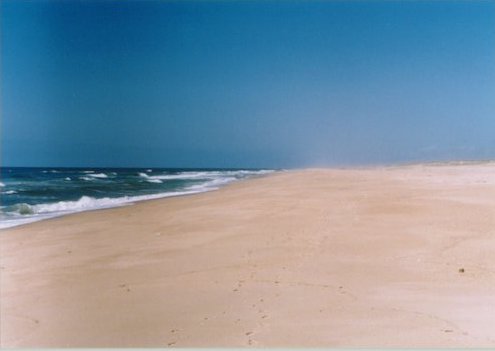
Be extremely careful in the forest, forest fires are very common in hot summers. No wonder - you often see a cigarette butt flying out of the window of a passing car.
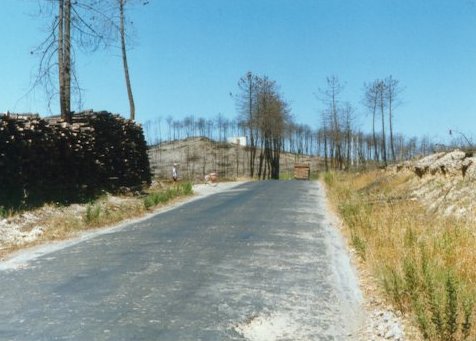
In the newly planted eucalyptus forests, grown on the site of burnt forests, it is difficult to find a flat plot. Be sure not to bring warm feather sleeping bags with you. Richly, all you need is a flannel sleeping bag insert and even a blanket sleeping bag for two in the mountains. Occasionally, especially in mountain valleys and by the water, dew falls, so it is probably better to sleep under a canopy.
Eating
Our people will probably not have a meal for everyday restaurants - for a hearty lunch for two in a cheaper restaurant, you will pay around 1000 PTE, so you have no choice but to cook. But don't bring unnecessary supplies. Shopping is worthwhile in larger cities, in shopping malls, called Super Mercado in Portuguese. You can buy a lot in the countryside, but you can still buy relatively cheap and tasty canned food: sardines, mackerel, tuna, several beans, lentils, sausages and much more.
Fresh sausages may seem unusually spicy. You can only get the bread we are used to here. You will have to thank the white or cornbread. You also usually don't pay more for vegetables and fruits than at home. You can alternate potatoes, pasta and rice as a side dish. It is important to have something to cook on. Of the small portable stoves, I recommend petrol or propane-butane. PB cartridges can be purchased at petrol pumps, but you can easily find only cartridges for CampingGaz inland. If you don't want to start another of the many forest fires, be sure not to start a fire. Handle the cooker very carefully.
Drinking water
You have to drink a lot and often. In a few days, you will find that sweat stops burning in your eyes. Small bicycle bottles are definitely not enough. 1.5 liter PET bottles are best suited, which you can easily store in modified old Favorit wire holders or under a rubber on a carrier. There is no problem with obtaining drinking water - clean and cold water flows from each pipe stuck in the rock even at the end of August.

In towns and most villages, you will find exemplary clean public toilets in the center, mostly near the church, where you can reliably replenish supplies. One full bottle per person will definitely be enough for another source even on the hottest days. Fill at least one more bottle for the night.
Hygiene
There are countless reservoirs with clear water all over the country.
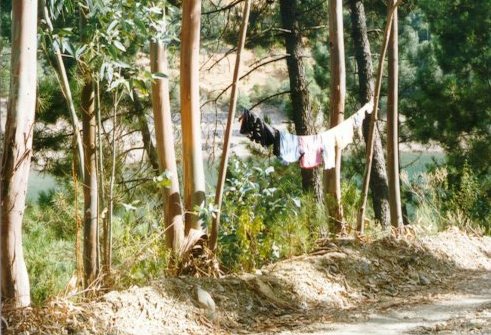
And mostly without people, maybe you will meet only a few fishermen. You can wash the dust off the roads and wash the sweaty laundry. However, you will have problems near the sea, especially where the coast is low and the tide blows salt water miles away from the estuaries. However, there are also showers in public toilets, and if you come across them, you have won. Passers-by may be staring at you in surprise, but no one will kick you out.
Service for cyclists
You should definitely take special tools and spare parts (center key, pinion disassembly key, wires, etc.) with you. They will be happy to help you in a car repair shop, but a vice, a hammer, common tools and goodwill are not always enough.
Transport to Portugal
Of course, the cyclist needs a bike with him. Bicycle rentals in Portugal are hard to find and our bike cannot afford to buy a new bike on site. They'll take your bike on the plane, but the prices! I could not find regular bus lines in the timetables and the train is also very expensive and the train journey is long.
So there is a car left. I assure you that it is possible to find such a route when the price of a flight does not exceed 10 to 11 thousand for the trip there and you will not pay a crown on tolls. You just need to plan your trip a little and know where the price of gasoline is. The cheapest in Europe is in Andorra, then in Spain and Switzerland, more expensive in Portugal, Germany and the most expensive for us is gasoline in France. Tolls are paid on most motorways in France and Portugal. In Spain, the main motorway routes, such as the Zaragoza - Madrid - Badajoz route, which can be used for us, are completely free of charge. Even if you don't use the toll motorways, two drivers can easily complete the route in less than 48 hours, even with regular rest stops. Don't forget to drink a lot along the way.
It is best to park your car for the entire holiday and rely only on bicycles. I think there is always someone who is free for you or for a small fee in the yard.
Translated by Google



